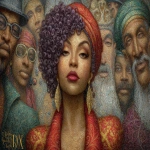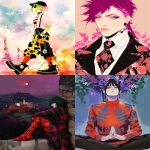Explore the Best AI Image Gallery

Blockchain in Finance: A New Canvas for Creative Industries
The world of finance is undergoing a profound transformation, fueled by the emergence of blockchain technology. While often associated with cryptocurrencies, blockchains decentralized and transparent nature holds immense potential to revolutionize various sectors, including the creative industries. This blog post explores this intersection, examining how blockchain is reshaping the financial landscape for artists, musicians, designers, and other creatives.
Empowering Creators: New Revenue Streams and Ownership Models
One of the most significant impacts of blockchain on the creative industry is its ability to empower creators by providing them with direct control over their work and its monetization. Traditionally, creative industries often rely on intermediaries like record labels, publishers, or galleries, who take a significant cut of the revenue generated. Blockchain technology disrupts this paradigm by enabling artists to sell their work directly to fans or collectors through non-fungible tokens (NFTs). NFTs are unique digital assets that represent ownership of a specific piece of creative content, such as music, art, or even virtual experiences. This direct connection between creators and consumers opens up new revenue streams and allows artists to retain a larger share of the profits.
Transparency and Traceability: Building Trust in the Creative Ecosystem
Another key benefit of blockchain is its inherent transparency and traceability. Every transaction on a blockchain network is recorded immutably, creating a public ledger that can be verified by anyone. This fosters trust and accountability within the creative ecosystem, as it ensures that ownership records are accurate and easily verifiable. For example, in the music industry, blockchain can track the provenance of songs, ensuring that royalties are distributed fairly to all contributors. Similarly, in art markets, blockchain can prevent forgery and counterfeiting by providing a secure record of an artworks authenticity and history.
Smart Contracts: Automating Creative Collaborations
Blockchain also enables the use of smart contracts, self-executing agreements written into code that automatically enforce terms when predefined conditions are met. This has significant implications for creative collaborations, as it can streamline workflows and ensure fair compensation. Imagine a scenario where musicians collaborate on a song: a smart contract could be programmed to automatically distribute royalties based on each artists contribution. This eliminates the need for intermediaries and reduces the risk of disputes.
Ethical Considerations: Navigating the Challenges of Blockchain in Creativity
While blockchain offers immense potential, it also raises ethical considerations that need careful attention. Data privacy is a crucial concern, as blockchain networks can potentially expose sensitive information about creators and their work. Its essential to ensure robust data protection measures are in place to safeguard user privacy. Furthermore, access to technology and digital literacy can create disparities within the creative community. Initiatives are needed to bridge this digital divide and ensure that all creatives have equal opportunities to benefit from blockchain technologies.
Future Trends: The Evolution of Blockchain in Creative Industries
The future of blockchain in creative industries is bright, with ongoing developments pushing the boundaries of innovation. We can expect to see:
- Decentralized Platforms for Content Creation and Distribution: Emerging platforms will empower creators to own and control their content while connecting directly with audiences.
- Immersive Experiences Powered by Blockchain: NFTs and blockchain can be used to create unique and interactive experiences in virtual reality (VR) and augmented reality (AR).
- Tokenized Intellectual Property Rights: Blockchain can securely track and manage intellectual property rights, ensuring that creators are fairly compensated for their work.
As blockchain technology continues to evolve, its impact on creative industries will undoubtedly grow. By embracing this transformative technology responsibly, we can unlock new possibilities for artistic expression, innovation, and economic empowerment within the creative community.








](https://images.ai-img.art/thumbnails/150/17edcb4f51c616e1278d716b510145bbc041556f71d621d2895f134892303315.webp)


](https://images.ai-img.art/thumbnails/150/26c257403e31dee6746c78e38bceb7def6011d04664049ef156f64a1c5497d44.webp)
](https://images.ai-img.art/thumbnails/150/e0118b29fe5cfc2e6592413bab22001f9af64b4b69c6ec903940c927cde44197.webp)



























](https://images.ai-img.art/thumbnails/150/3d91370d58b2f68867187ea56dc69c37d746fdadd44b521d87b1bf1df5d10f40.webp)







](https://images.ai-img.art/thumbnails/150/27af9f0bb8b7c7d503263849abaf3ede0e1acd1c8e0bdaba4700f845a674a0fc.webp)
